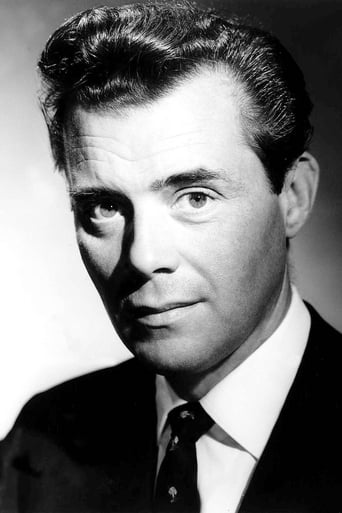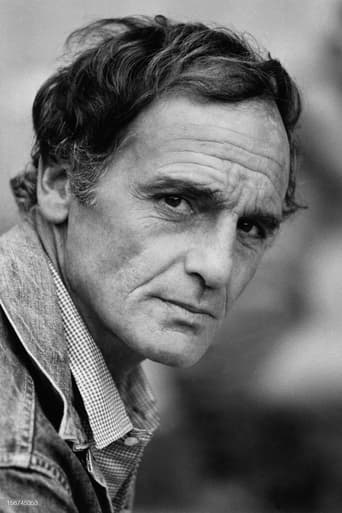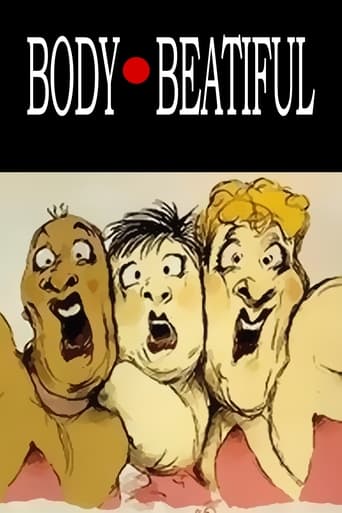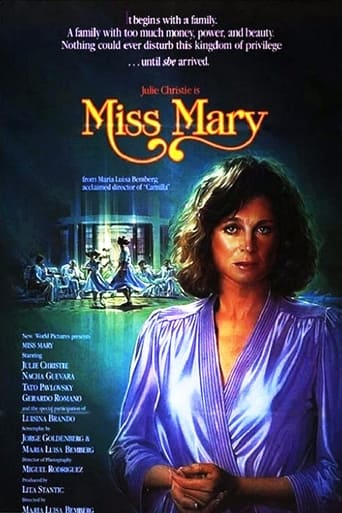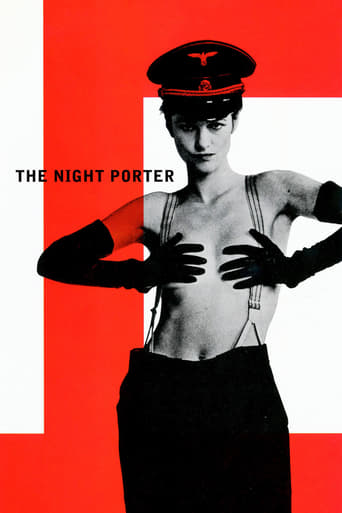
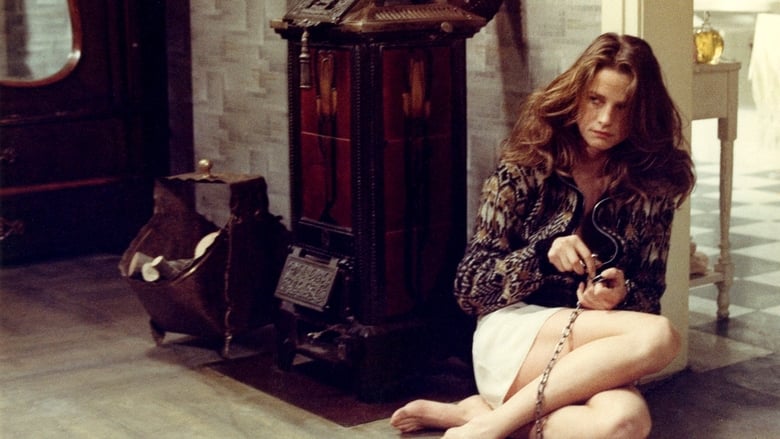
The Night Porter (1974)
A concentration camp survivor discovers her former torturer and lover working as a porter at a hotel in postwar Vienna. When the couple attempt to re-create their sadomasochistic relationship, his former SS comrades begin to stalk them.
Watch Trailer
Cast
Similar titles
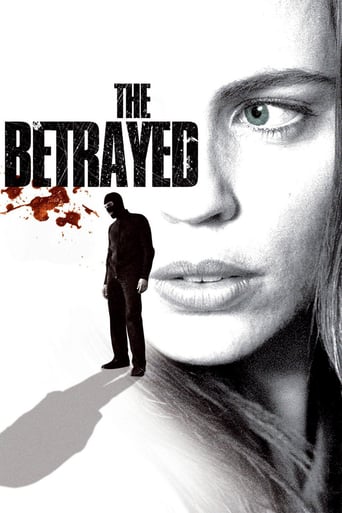
Reviews
I'll tell you why so serious
good back-story, and good acting
It's an amazing and heartbreaking story.
While it is a pity that the story wasn't told with more visual finesse, this is trivial compared to our real-world problems. It takes a good movie to put that into perspective.
THE NIGHT PORTER, is a doomed love story in its kernel while being notorious for its sadomasochistic exploitation between not any random two, but Max (Bogarde), a former Nazi SS officer and Lucia (Rampling), his prisoner in the concentration camp. It is such a campy plot design, blatantly excites for controversy. Directed by the Italian art-house cult- director Liliana Cavani, my very first foray into her filmography, what sticks in my mind after watching is not the sensational perverseness of the sex act, but a tenacious nihilism animated by those two equally impenetrable characters, with the most passive and futile resistance, it is a fearless scenario of two against the whole world, nothing else matters, as long as they can march toward their grim fate together, no compromise or whatsoever, which is intensely heart-rending. Vienna 1957, 13 years after WWII, Max now is a hotel's night porter, and by a mere chance, Lucia and her husband, an orchestra conductor come to perform in the city and stay in the same hotel. This unexpected encounter stirs memory flashbacks in both and instigated by Mozart's MAGIC FLUTE, which is conducted by Lucia's husband, their mutual longing reaches the boiling point, the sadomasochistic torment (more spiritually than physically) which generates the irresistible pleasure, reunites them, Lucia leaves her husband and moves into Max's cramped apartment, even voluntarily being chained inside, if that's so, as long as everything is consensual, they might be the happiest couple in the world. However, Max is an ex-Bazi officer, and is currently involved with a coterie of former SS comrades, lead by Hans (Ferzetti), they are intent on destroying any documents and dispatching all the possible surviving witnesses in order to clear their names so that they can live in peace. So, when they find out Lucia's presence, both her and Max's lives are at critical stake. Well, one major drawback in the plot is the elliptical motivations of the coterie, on the surface, they arrange a certain trial of its members individually, yet, an ultimate purpose is to eliminate all the evidences associated in the war crime (as Max mercilessly murdered one of his witness, we can only hear the voice-overs playing while on screen it is Max in his apartment, disconcerted), so why on earth they need such a trial? Some kind of remedial therapy? Moreover, in the scenes where Hans faces Lucia alone in the apartment, obviously, it is much easier to whisk her away or simply finish her off, so she will no longer be a threat, but instead, Hans painstakingly wheedles her to be the witness in the so-called trial against Max, which is rather perplexing.From then on, the narrative steers towards the hungry strike in a claustrophobic status, aimlessly hemmed in the apartment, Max and Lucia indulge in their memories, haunted by their memories and can only get excited through their memories, complete devoid of any political agenda, it is a battle between human's primal sex impulse and basic desire to survive. Ms. Rampling is renown for taking unorthodox projects and braving challenging roles, here, apart from her strikingly alluring solo-dancing scenes among Nazi officers, which doesn't connect the story necessarily, instead impairing her vulnerable status as a powerless victim, indeed is a hyped gambit to be shamelessly titillating and contentious. She compellingly conveys Lucia's abstruse psyche through her expressive facial expressions and body languages; Bogarde, symmetrically excellent in veiling Max's complex lust with a chilling sophistication, both can be gauged as the top-picks of their eclectic careers. Shot in lurid Technicolor in 35mm, THE NIGHT PORTER is unequivocally Cavani's most popular work and fairly speaking, it is a singular curio might find audience among those who are not feeble-minded and vacant from all the political innuendos, also one has to accept that it doesn't conform to the formula where in the upshot, those loathsome wrongdoers never get their comeuppance.
Dark, depressing, and, at times, deeply disgusting, Liliana Cavani's The Night Porter (1974) is undoubtedly one of the most emphatic examinations of sadomasochistic love in all cinema.Charlotte Rampling plays the challenging part of a sexually depraved Holocaust victim with such remarkable poise and conviction that it never really comes across as a performance. In spite of ourselves, we can't help but approve of her strange actions and behavior.The grueling part of the Nazi officer who abuses her, both physically and emotionally, is sublimely played by the great English actor Dirk Bogarde. It's a role that a lesser actor could have made appear vulgar, but, vintage Bogarde, we get to vicariously experience the masochistic pain and suffering that his character goes through every time he abuses his helpless victim.The Night Porter is certainly not a movie for the faint hearted and the only way to appreciate is to watch it with an open mind, by letting go of bigotry, conservatism and prejudice. Viewer discretion is advised.For more on the world of cinema, please visit my film blog "A Potpourri of Vestiges".
A wayward exploitation of the cinematic 'Nazi Evil' cliché, which prevailed throughout the seventies horror cinema; from mad doctors/scientists to jail guards with a penchant for bondage and puerile victims willingly giving themselves to the morbid fantasies of the script writer.The nonsensical screenplay of 'The Night Porter' pays homage to the latter and also adds to the distress of anti-porn activists by throwing in an uncomfortable-to- watch set piece.A holocaust victim suffering from the Stockholm Syndrome finds herself helplessly drawn to the impeccable and aching charms of a former tormentor and SS officer who has given himself to the succulent comfort of a non-significant existence after having basked in the degenerating excesses, which apparently the SS life offered.In hiding, we are shown, he has become a night porter at a hotel in post-war Vienna and prefers to live like a 'church mouse'. After their chance meeting both are ostensibly pulled into a dangerous game of lurid passion. A passion which is explored with more seriousness and insight in Star 80 (83).While Star 80 shows us the lecherous, conflicted and tragic demise of the American dream and destiny, The Night Porter simply wants us to swallow whole the idea of misplaced feelings and deviant sexual overplay as if it were a bonafide means to post trauma catharsis. If it weren't for the fervor in Cavani's operatic exploration, Charloette Rampling's off the rack and risqué performance and Bogarde's sullen yet decisive night porter the film would have been forgotten.
We Americans are, of course, famous for, among other things, our simplistic view of history. Most of us learned that Germany lost WWII, end of problem. I think The Night Porter is of value mainly because it points out, rather vividly, that Nazis did not disappear, they went into hiding. Not many other films seriously deal with that reality. So, yes, all the trappings of Nazism are indeed on display and that is understandably controversial. But if you look a little deeper you will see a more penetrating analysis of the problem of evil. The end of WWII was not end of story. The fact that this film dramatizes the continuation of Nazi ideology makes it, perhaps surprisingly, worthwhile.
